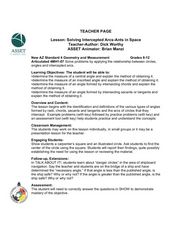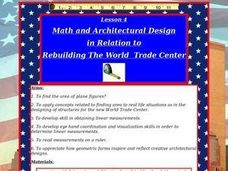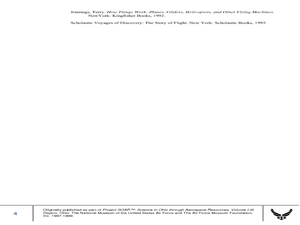LABScI
Cell Diffusion and Permeability: The See-Thru Egg Lab
Create a model to study a microscopic phenomenon. The seventh of 12 lessons uses an egg (without its shell) to represent a cell membrane. Using different solutions, learners explore the concept of cell diffusion. They monitor...
Curated OER
Polygonal Strings
Sixth graders apply knowledge of how to calculate the area and perimeter of triangles. They determine why it is inappropriate to measure the area of land by its perimeter which is done in certain areas of New Guinea. They complete a...
Curated OER
Artistic Angles
Fifth graders explore angles by using protractors. They recognize, describe and determine the surface area and volume of three-dimensional shapes. Students recognize the right angle, acute angle, obtuse angle and vertex. They identify...
Curated OER
Sectors of Pizza
Students identify the properties of a circle. In this geometry activity, students relate properties of diameter to sections of a pizza. They calculate the measure of an arc and missing angles.
Curated OER
Treaties Grade 11
Eleventh graders examine the First Nations Treaty. In this Canadian history instructional activity, 11th graders participate in talking circles that require them to compare "Human Rights," with the First Nations Treaty.
Curated OER
Math and Circumference
Sixth graders explore geometry by utilizing mathematical formulas. In this circumference activity, 6th graders identify the difference between diameter, circumference and radius in a circle. Students review the formulas for finding...
Curated OER
Mandala Art
Students investigate art elements such as color schemes and proportion by creating their own personal Mandala Circle on paper or canvas. This also allows students to investigate mathematical concepts such as tesselations or social...
Curated OER
Governance Grade 10
Students participate in talking circles regarding governance issues. In this self-governance lesson, students examine First Nations and land claims in the Great Slave Lake area in Canada.
Curated OER
Solving Intercepted Arcs
Students investigate circles and its arcs. In this geometry lesson, students identify the relationship between an circle and its intercepted arcs. THey identify the central and inscribed angles.
Curated OER
Measurement
Seventh graders measure surface area. In this geometry lesson, 7th graders find the surface area of various geometrical shapes. Using a computer program, students compute the area of 2-D and 3-D shapes. Students use graph paper to trace...
Curated OER
Mother's Day Flowers
Students complete a circle map describing why they love their mom and use a flower template to type the ways. Then they insert a digital picture into the center of the flower. The flowers are then printed out and given to their mothers...
Curated OER
Triangles with Collinear Circumcenters
Students identify the circumcenter of a triangle. In this geometry lesson, students construct a perpendicular bisector using a straight edge and a compass. They differentiate between triangles and collinear points.
Curated OER
Math and Architectural Design in Relation to Rebuilding The World Trade Center
Learners discover building plans and practice reading measurements. In this architectural design lesson, students investigate the areas of the specific World Trade Center locations that need to be rebuilt and determine the cost....
Curated OER
Some Like it Cold: Canada's Northern Communities
Fifth graders examine cultures close to the arctic circle. In this geography lesson, 5th graders consider the impact of climate on cultural development of arctic communities. Students research a given community and present their findings...
Curated OER
Treaties- Grade 7
Seventh graders examine treaties pertaining to the Canadian natives. In this Canadian history lesson, 7th graders research and discuss the negotiations that took place between the First Nations cultures and the Canadian government over...
Curated OER
Governance - Grade 8
Eighth graders participate in talking circles. In this self-governance lesson, 8th graders examine human rights from the perspective of Native Americans. Students discuss the Canadian Charter of Rights and Freedoms as well as "Interview:...
Curated OER
Modern Culture and Society
Sixth graders investigate different cultures by comparing the United States to Europe. In this social structure lesson, 6th graders discuss the economies, religions, languages and cultures in the Americas and Europe and define their...
Curated OER
Current Events Activity
Students investigate world news and create a performance from their research. In this current events instructional activity, students identify major political or news stories in the media and create a performance based on a character...
Curated OER
Wobbling in Circles
Sixth graders role play the parts of the sun, the moon and the Earth as they simulate the concepts of revolution and rotation. They act out the parts in small groups and discuss the concepts as a class.
Curated OER
Art Lesson: My Symbol
Students explore and brainstorm the concept of symbols in real world applications and create a poem describing themselves. They design and paint a symbol that represents him/herself utilizing the technique of simplification to express...
Curated OER
Fun Ideas for Getting A-Round in Math CIRCLES
Students see circles in real life and have fun with them
Curated OER
Dilations of 2 and 3 dimentional figures and their effect on area, surface area, and volume.
Seventh graders investigate the area and volume of 2D and 3D figures. In this geometry lesson, 7th graders create a storyboard explaining their knowledge of 2D and 3D shapes. They analyze their data and interpret their results.
Curated OER
Area of Parallelograms
Seventh graders review the process of finding the area of a rectangle and complete a couple of examples as a class. They discuss what a parallelogram is and what the formula would be for finding its area. They listen to an explanation...
Curated OER
Parachutes: Is it Surface Area or Shape?
Young scholars investigate how to make a good parachute. In this physics activity, students observe the motion of parachutes as it falls and measure the time. They collect data and calculate the average descent time for each canopy shape.

























